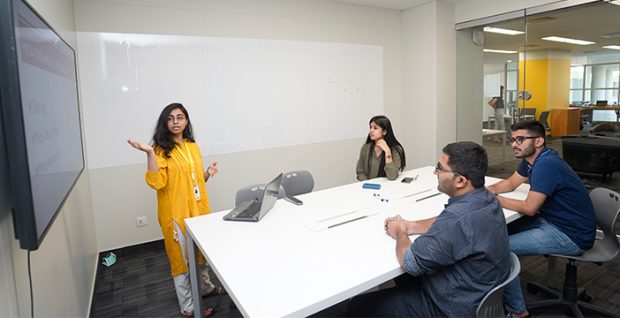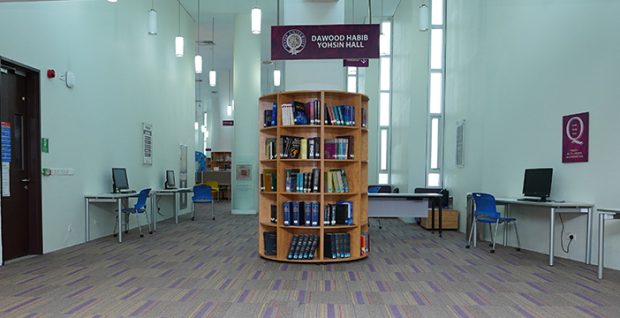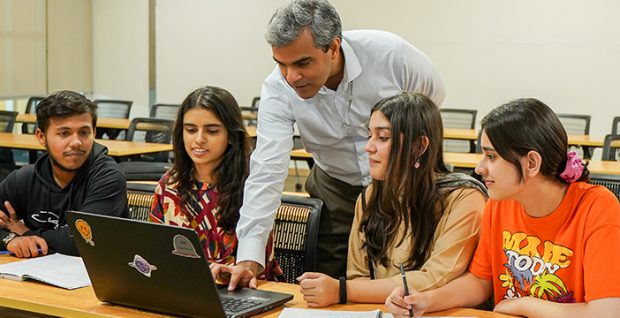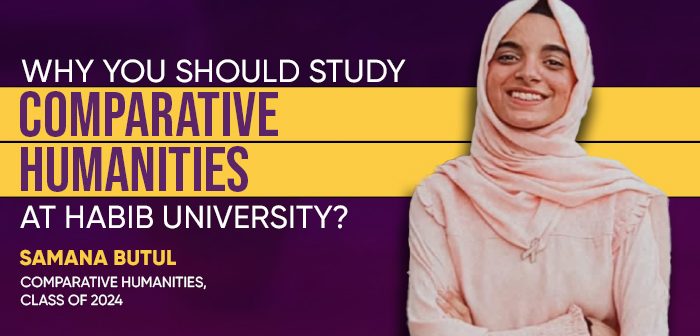I joined Habib University with Pre-Engineering background and had no knowledge about Comparative Humanities. The only thing I had was my passion to dive into this field. Habib University’s culture gave me the flexibility and assurance to pursue my field. I took help from peers, asked my faculty, and utilized resources to make my place. Habib is inclusive for all educational backgrounds, intellect, and experiences to pursue this field.
Comparative Humanities is a field for humans. It doesn’t cover the biological, technical, or modernized version of human needs, but it covers the human history dwelling between the visible and invisible realms. Our field focuses on history lived, literature written, philosophy interpreted and religions followed by humans in one subject. It concentrates mainly on the nuances of storytelling analyzed by the skill of critical thinking, giving us a platform to think beyond the bubble of colonized mindsets.
An Intellectual Support System Never Seen Before
Habib University’s culture makes this field riveting as it provides the freedom to think, confidence to question, and ears to listen to the unheard voices inside human beings. The world-class faculty and diverse student body at Habib University make an ideal environment for studying BA in Humanities.

Students seeking guidance at Habib University’s Writing Center where students get one on one tutoring to improve their writing credentials.
Comparative Humanities at Habib University gives a perfect curriculum to learn. The courses, workload management, and discussions are no less than any other foreign university. Habib University has writing centers, a research office, and career services which help us broaden our horizon of learning and puts us in front of many career opportunities. Recently, I did research on Religious Studies in the summer with a faculty, and also participated in Rustigi Conference at the University of Buffalo where I presented my Research Paper.
Learning, Unlearning and Relearning at Habib University
Habib University which is the best university in Pakistan owns a diverse culture. We have students from different cultures, ethnicity, nationality, and socio-economic backgrounds. It broadens the horizons of our learning as a community. Comparative Humanities is a field of thinking beyond the sphere, and diversity at Habib ensures this by giving us a perfect environment to learn and grow. The philosophy of Habib University works in learning, unlearning, and relearning. We come here to unlearn a lot of things to learn our YOHSIN values.

On January 8, 2019, the Yohsin Hall, a sanctum of learning located inside the Habib University library was named after the late Dawood Habib to give a tribute to his endless contribution towards higher education.
Yohsin encompasses five major paradigms: striving for Excellence; appreciating Aesthetics (beauty); nurturing Passion; Respecting others, and Serving the communities in which we reside. The philosophy of Habib University revolves around these values, which gives us a platform to embrace arts and aesthetics in everything. We learn the truth behind “husn” of a person in learning philosophy, literature, history, religion, and music that nourishes our soul and makes it fertile.
A Student-Centric Institution
Habib University is a student-centric institution. We have student-centric discussions, which give us immense confidence to lead the world behind us. Habib ensures to provide opportunities to lead and conquer. As a humanities student, I also serve as the President of the Serve Club, and I am involved in so many other activities, which give me a chance to practice what I learn and unlearn.

Habib University takes pride in boasting the best faculty in Pakistan having global academic exposure with excellent pedagogical skills.
Habib University has the best faculty to offer in this field in Pakistan. We have faculty of different backgrounds, nationalities, and ethnicities to teach. It helps us to have a more diverse experience than any other field can offer. The faculty at Habib University is helpful and accommodating. Their vast knowledge and expertise in particular fields give us a ground to explore more in our field. They give us the liberty to question beyond any constraint and stereotypes.
Thus, I find Habib University as the best institution to offer admissions for Comparative Humanities in Pakistan. Despite having no prior knowledge about my major before, Habib has turned my passion into a reality that I am living. The culture, environment, diversity, faculty, staff, and everyone here helped me to live my passion. Don’t miss your chance to enroll in Comparative Humanities program. Apply now for Admissions Fall 2023
The blog is written by Samana Butul, Comparative Humanities student from the Class of 2024.




